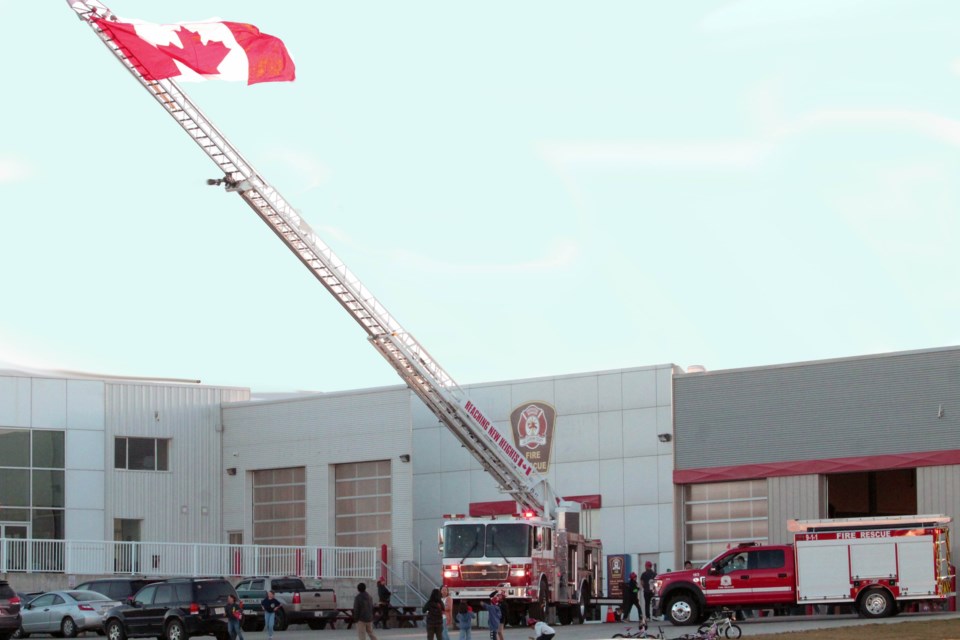LAC LA BICHE - Despite the falling leaves to the brown grass below, not all the seasons are changing.
Wildfire season is still in effect, says a senior fire officer in the Lakeland region.
After months where massive wildfires across the country stole the headlines, the fire dangers continue locally — especially after a dry summer like that, says Lac La Biche County’s Regional Fire Chief John Kokotilo.
“We actually have two wildfire seasons every year – Spring and Fall – with spring being the busier one due to the amount of dead dry grass. Fall can also be demanding on our fire crews especially if we do not get moisture prior to snowfall,” he tells Lakeland This Week.
It may feel like winter is on its way, and some may feel that “we are out of the woods, so to speak with wildfires,” says Kokotilo, who is also the municipality’s manager of Protective Services, “but just because it is fall does not mean that the fire hazard is gone – it will be with us until we have adequate snow cover.”
Firefighters from across the region have continued to respond to grass fires in the last few weeks, with Lac La Biche fire crews most recently putting out a grass fire on property within the Lac La Biche hamlet near the downtown railyard. That fire was suspected to have been sparked by a thrown cigarette or embers from a small, outdoor cooking fire. The fire was the latest in more than 200 wildfire responses made by Lac La Biche County municipal firefighters so far in 2023.
Staying smart about fires
It was only a few weeks ago that the region’s fire hazard was at the Extreme level, he said reminding residents that proper education and caution needs to continue.
The municipality and others across the region subscribe to the national FIRESMART program, an education tool used by fire departments to better prepare residents living in rural areas for fires.
Kokotilo can’t stress enough — at any time of the year — the importance of being prepared for fire, and mitigating the risks to avoid it. The FIRESMART program offers help to residents clearing property of debris and vegetation that can quickly spread fires. It also offers subsidized purchase options for exterior building sprinkler systems, and other fire prevention measures.
Local fire crews have seen the positive effects of proper fire education.
In one of the busiest fire seasons on record across Western Canada, several local crews were sent to other municipalities to assist with firefighting. Kokotilo said a local team that recently returned from assisting with the Northwest Territories fires said they saw entire neighbourhoods burned down, except for homes where the owners had taken precautions.
“Our SPU – Structure Protection Unit — crews returned from NWT and after we debriefed – they mentioned how complete areas were burned out save for one or two residents that obviously were FIRE SMART,” he said.
FIRESMART information can be found on the websites of most municipalities in the region.
Kokotilo and area fire officials continue to caution the public about dry conditions in fields and forests. The regional fire chief says the recent warmer weather has meant that many people are still heading out into rural areas for outdoor recreation. Off highway vehicles, farm machinery and any motorized equipment being used outdoors should be checked regularly for maintenance issues and any build-up of grass or vegetation that could trigger a fire.
The fire chief says moisture levels, education, the hard work of fire crews … and a bit of luck … all play factors in firefighting.
“All in all, we have been very lucky this year with our quick mitigation of these incidents and the professional, hard work by our members. We could have just as easily been in a different state as what most of the province, NWT, and BC were this year,” he said.
Even as the temperatures change and the winter months approach, Kokotilo says fire concerns are cyclical, and the effects of this winter will influence next year’s main fire season.
“You can also expect a busy spring wildfire season if we do not accumulate sufficient snow-pack during the winter months and if unseasonable higher temperatures arrive in the spring. The snow melt “runs off” without soaking into the ground which will most definitely bring higher wildfire hazards,” he said.



